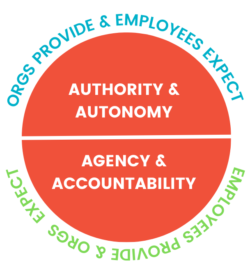03rd July 2023
The Four As of Mutual Obligation
Too many meetings without decisions? People taking too many things ‘offline’? People feeling micro-managed yet execs say people aren’t making decisions and referring things up?
What’s going on?
In our experience these issues indicate lack of clarity in who does what, and or, what is expected.
Lack of clarity is the primary reason for failure in business and personal life.
Brian Tracy, Peter Chee, 12 Disciplines of Leadership Excellence
We’ve talked before about the important elements of a well-crafted position description, and how Purpose and Outcomes are critical to being able to answer the question; What could you get fired for? He we dig a little deeper into the mutual obligations of performance.
Mutual obligation concerns what organisations must provide their employees and what organisations should expect in return from employees. And of course, the reverse applies, what employees should expect and what they should be prepared to offer. Here’s how the mutual obligations of organisational performance play out in 4 As.
There are two things the organisation must provide, and employees expect:
- Authority
- Autonomy
And there are two things employees must provide, and the organisation expect:
- Agency
- Accountability
AUTHORITY
Authority is the power to make decisions, allocate resources, and direct the activities of others. Individuals with authority have the power to enforce decisions and expect compliance from others. Clear authority:
- Ensures decisions are made promptly, providing clarity and direction to achieve organisational objectives.
- Ensures individuals can allocate resources based on organisational priorities, ensuring optimal utilisation and alignment with strategic goals.
- Establishes a clear chain of responsibility and accountability within an organisation, enabling effective performance management and evaluation.
Every employee should be clear on the bounds of their authority and the decisions the organisation expects them to make on their own. Likewise, organisations are systems, so every employee should be clear on when they need to consult on a decision. Clarity of authority speeds up organisational performance.
Authority is being allocated a budget of $1,000,000.
AUTONOMY
Autonomy is having the freedom to make decisions and take actions independently within the scope of your level of Authority. It means being empowered to exercise judgment, set goals, prioritise tasks, choose your responses and determine how to approach and complete your work without being excessively micromanaged. Autonomy is not some altruistic gesture. Done properly granting autonomy:
- Demonstrates trust and respect an employee’s capabilities,
- Fosters a sense of ownership, motivation, and job satisfaction.
- Creates the space for employees to think critically, explore new ideas, and find innovative solutions to challenges, leading to improved productivity and competitiveness.
- Allows individuals or teams to respond quickly to changing circumstances, make necessary adjustments, and take proactive measures to meet organisational goals.
- Helps attract and retain the kind of talent who value independence and the opportunity to make a meaningful impact.
Autonomy is being free to choose how to spend $1,000,000.
AUTHORITY provides structure and direction, and AUTONOMY empowers employees, promotes innovation, and enhances overall organisational performance.
AGENCY
Agency is the capacity to act and exert influence in the world. It is the extent to which you make choices, take initiative, and have a sense of personal control and impact on your environment. Agency encompasses not only decision-making and action within the workplace but also extends to a broader context of personal empowerment and self-determination.
People with agency have growth mindset underpinning their personal leadership. Rather than passively reacting to external forces, agency means you take charge and drive yourself, your team, and your organisation forward. This proactive approach is vital in today’s landscape, where agility and adaptability are key to staying ahead. Agency requires a clear sense of purpose and direction and actively working towards achieving your goals.
Agency is the mindset that drives you to make the most of $1,000,000 budget.
ACCOUNTABILITY
Accountability is about being answerable for the outcomes and results of our actions and decisions. It is the obligation take responsibility for our performance and the impact of our work on organisational goals. Accountability involves being transparent, reliable, and delivering on commitments made to oneself, colleagues, and the organisation. And when we don’t deliver, we then don’t try to explain it away, deflect blame, or justify our result. We learn from it.
We know that when people take accountability for their decisions and actions, it sets a powerful example for the people we lead and the people around us by showing that we are willing to stand behind our choices, even in challenging or unfavourable circumstances. Trust and integrity anyone?
Accountability is standing behind the assessment of the outcomes of how you spent $1,000,000.
Employees with AGENCY get things done, and personal ACCOUNTABILITY is as central to learning as it is to performance.
IN SUMMARY
In a healthy work environment, organisations ensure every single person understands the breadth and limits of their authority and autonomy and employees self-direct and stand up for their results. And it plays out in our simple example:
Authority is being allocated a budget of $1,000,000.
Autonomy is being free to choose how to spend $1,000,000.
Agency is the mindset that drives you to make the most of $1,000,000.
Accountability is standing behind the assessment of the outcomes of how you spent $1,000,000.
Making things simple is hard work, but it will reap significant rewards in terms of efficiency and effectiveness and ultimately organisational and individual learning and performance.
“Clarity and simplicity are the antidotes to complexity and uncertainty.”
General George Casey
Categories: Designing Organisations Uncategorised




